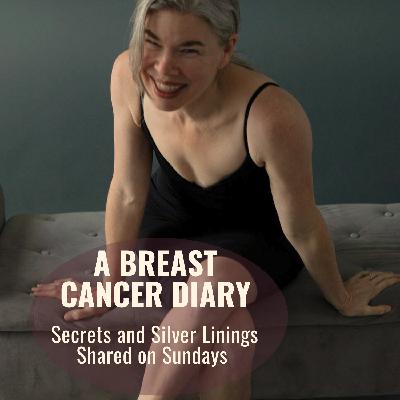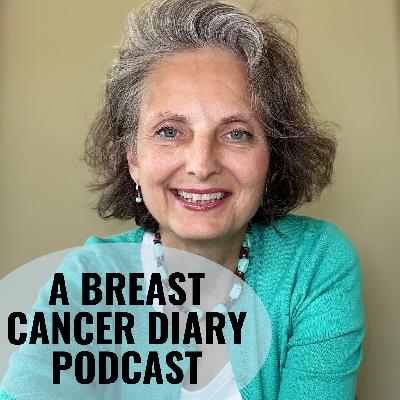Dragon Boat Paddling after Breast Cancer
Description
My new friend Lori is an amazing advocate for the power of exercise oncology and she's a wonderful hostess and educator here in the Northwest for those who want to try dragonboat paddling. As a 17 year survivor of breast cancer, she's met a lot of other breast cancer patients and her insights are so clear around one big value: just keep moving. I'm looking forward to having her back for a part two discussion. This was not enough for me!
Don't forget to rate and review the show and if you want to enter for a prize for doing so, email a screenshot of your review to me at kathleenmoss@protonmail.com
Subscribe on: APPLE PODCASTS - SPOTIFY - AMAZON
Or watch on YouTube: https://youtu.be/agbu6QjDiXs
Support my work by making a donation here:
https://liberapay.com/abreastcancerdiary/
Join my Newsletter List here:
https://abreastcancerdiary.substack.com
Transcript:
My guest today is Lori Godfrey, another local breast cancer survivor in my own community. She lives in Banks, Oregon, and she is retired from her role as senior vice president at KeyBank. I wanted to talk to Lori today about her experience on a team of dragon boat paddlers called the Rose City Rockets.
She is a breast cancer survivor with a history of a diagnosis of stage 3B. Ductal breast cancer at age 49 in 2008, and she has not had a recurrence since. Welcome, Lori.
L:
Oh, thank you so much for having me today. Really enjoy it, being here today.
K:
Yeah, and for those of you who just watched my YouTube version of the interview with Danielle in the last couple of episodes, Lori is featured in that, in those gorgeous photos that we had as the montage in the background. So you might recognize her from that. So Lori, tell me about your experience joining this local Dragonboat team and what that's been like. How did you find them? How did you find out about them? What has that been like for you?
L:
My favorite subject, so I'm glad to be able to talk about it today. So the Rose City Rockets are an all cancer dragon boat team that was established just last year, officially in 2023, but we were on the water for the first time in 2024. I'm actually the founder, not only the founder, but the head coach for. Rose City Rockets. I started dragon boating with an all breast cancer team 14 years ago. And that's the Pink Phoenix dragon boat team that's also located here in Portland. They were the first all cancer, excuse me, all breast cancer team in the US. They were the second to be established globally. And that started a great big trend of women getting on boats for the first time in their lives, which was really my experience. I met Pink Phoenix, as I said, so many years ago, here in Portland at a Susan G. Komen walk. And they had a booth, I went up to talk with them, and within the week I was on the boat for the first time with them. That started a great, um, really a lifelong relationship. change for me. Um, I had been an athlete my entire life and was really felt very sidelined by my breast cancer. And that experience alone was what, and has kept me going in dragon boating, is that knowledge that I'm a lifetime learner, I'm a lifetime athlete, I'm looking for things that I can do. Those that have had a breast cancer diagnosis some 20 plus years ago given different experiences. information than women today. Previously, they were, uh, all concerned and still are concerned about lymphedema. So women that have breast cancer may have massive, uh, surgeries, obviously a mastectomy being a primary one. And when they do that kind of surgery, you know, you have these scars and these scar tissues that are there afterwards. And they're very difficult to break through and the lymphatic system starts to, um, get compromised, obviously. And you start, you can get lymphedema. So women were told, don't do repetition, don't do repetitive, uh, repetitive motions and no more vacuuming, no more tennis, no more golf.
So some of those sports that women would be able to do for a lifetime were no longer. available to them. So, uh, Dr. Don McKenzie, who is out of Vancouver, B. C., um, started a clinical trial, and his clinical trial was to establish and determine if women that did a repetitive motion, such as in paddling, uh, if they would have lymphedema, if they would have a recurrence or an episode or a flare of lymphedema. So, they pulled together these women, approximately 24 of them, to be in that first clinical trial that also was a team. Dr. Don happened to be a paddler And so he trained those women to be in a competition, had them on the water. They competed. He gathered the information that he needed and then when they were finished, attempted to disband them.
And they refused. Basically, they were having the time of their lives and they said, no, we're not going to go. Thank you very much. So, that first breast cancer team, uh, called “Breast in the Boat” and they're in Canada, in Vancouver, BC. And there's lots of that have found breast cancer, excuse me, um, paddling through breast cancer survivorship through, uh, just that support group that's there.
So that's how I started. I began as a local paddler and from there I was, within a couple of years, became what's known as a pickup paddler and a utility paddler and I started paddling with other teams around the area and then regionally and then one thing led to the next and I realized that Dragon Boating wasn't just happening in Portland, it was happening regionally, it was happening nationally, it was also happening globally. And that'sreally what changed my life, was those global outreach opportunities that I've been able to do via paddling. I've been able to make all these connections. with other breast cancer survivors throughout the globe that have really been life changing.
K:
That's great. So, you started doing it on, like, a weekly basis? Monthly? Or is it seasonal? How does it work?
L:
That's a great question. So I think a lot of people, especially here in Portland, if anybody's listening that knows Portland, knows the Rose Festival boats and the Rose. Yes, I was a paddler. I've done dragon boating before. And what they're referring to typically are the Rose Festival boats that take place in June and where the fleet comes in and we have it part of our Rose Festival celebration that we have here in Portland. that's all that I really knew about, um, the Rose Festival and about dragon boating happened to be that particular event. But that's not all that it is. That's a unique, very stylized boat that is not really used for anything but a festival. There are racing hulls, long canoes that we use globally. And so I started with Pink Phoenix. Uh, we paddled Monday, Wednesday, Friday. Also once, excuse me, Monday, Wednesday, Saturday mornings is Pink Phoenix schedule. And so it was three times a week. And so I just plugged into that experience three times a week. Never miss practice. Did it while I worked. Um, they work, they practice in the evenings.
You know, it would just change my whole life around to have a block of time in the evenings that I wouldn't be disturbed. And that was the greatest thing about dragon boating for me was the quiet. I was able to take my phone, put it on silence for the evening. Get on the water and only be responsible for myself and my team. And listen to the water, listen to the air, experience being outside, and being on a great big huge river, that's really pretty demanding. And then learn a new sport as well at the same time. So it was, there's a lot to take in when you first start dragon boating.
K:
And so, you started on the Willamette. Are you still on the Willamette?
L:
Yeah, still on the Willamette. So, I've paddled all over the globe, and so that's taken me on to both rivers, like







